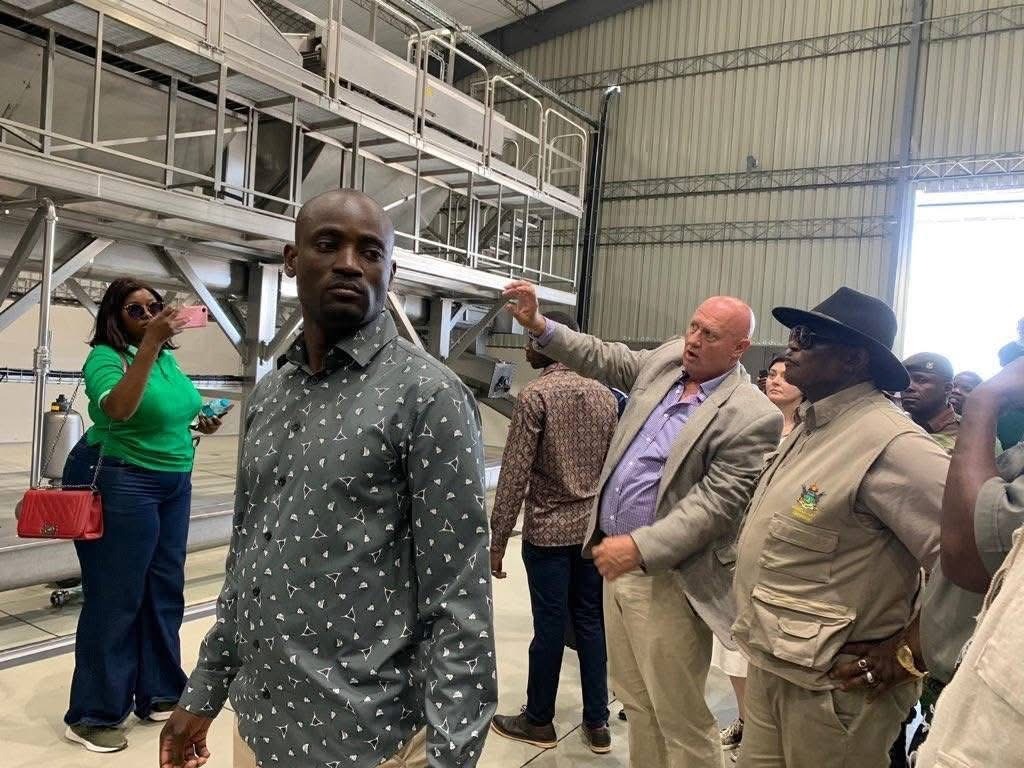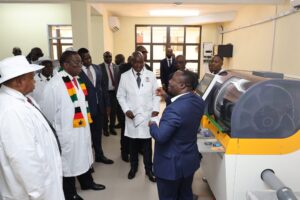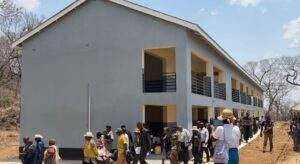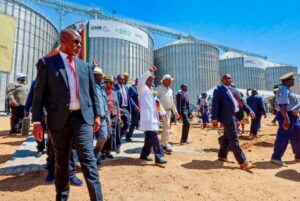VP Chiwenga Lauds Rural Industrialization During Tour of Orange Ville Juicing Plant
5 min read
Beitbridge – Zimbabwe’s economic transformation agenda under Vision 2030 received a major boost yesterday after Vice President General (Retired) Dr. Constantino G.D.N. Chiwenga toured the state-of-the-art Orange Ville Fruit Juicing Plant in Beitbridge, Matabeleland South—an investment expected to change the economic face of the border district and stimulate rural industrialisation.
The US$30 million facility, which became operational in July 2025, is one of the largest citrus processing plants in Southern Africa.
The plant is already processing hundreds of tonnes of oranges daily and has crushed more than 25,000 tonnes of fruit within just three months of production.
During the high-profile tour, VP Chiwenga was joined by senior government officials, local farmers, representatives from the Ministry of Industry and Commerce, and members of the Beitbridge Rural District Council.
He expressed satisfaction with the plant’s progress and alignment with national priorities.
Addressing stakeholders at the end of the tour, VP Chiwenga commended the project as a flagship example of value addition and agro-industrial growth, key pillars of Zimbabwe’s economic policy.
“This plant is not just about juice production; it represents the future of rural economic empowerment. It is a practical demonstration of our commitment under Vision 2030 to industrialise rural communities and create industries where people live. We cannot continue exporting raw materials while importing finished products,” he said.
He highlighted that the Orange Ville plant was a model of local transformation, particularly because it draws raw material from local farmers and stimulates the citrus agricultural value chain across Beitbridge, Chiredzi, Mwenezi, and parts of Masvingo and Midlands.
Currently employing 290 full-time workers, the plant is expected to grow exponentially and create over 3,000 direct and indirect jobs at full operational capacity.
According to Orange Ville’s General Manager, production will expand in phases to incorporate additional product lines including mango and lemon concentrates, fruit pulps, essential oils, livestock feed from peel waste, and possibly bottled beverages.
“We are not just building a factory—we are building an entire ecosystem,” he said.
“From farmers to transporters, packaging suppliers, and export logistics, this plant will stimulate business across the entire citrus belt.”
Local villagers interviewed during the tour described the project as a lifeline for Beitbridge, long known more as a transit town than a manufacturing hub.
For decades, citrus farmers in southern Zimbabwe struggled with limited market access, often selling produce to middlemen at loss-making prices or watching surplus fruit rot due to lack of processing facilities.
The arrival of Orange Ville has revolutionised the local agriculture economy by guaranteeing farmers a stable market and competitive prices.
Beitbridge farmer Mrs. Nyaradzo Maseko said the juicing plant had restored hope to struggling rural communities.
“For the first time we are seeing real value for our oranges. We no longer worry about market access. Now we are expanding our orchards because we know there is demand,” she said.
The plant currently sources fruit from over 1,200 smallholder and commercial citrus farmers and is contracting more producers to meet its ambitious daily processing targets.
The juicing plant is already exporting frozen orange concentrate and citrus oil to South Africa, the United Arab Emirates, China, and the European Union.
These exports are expected to generate millions in foreign currency revenue annually.
Zimbabwe’s citrus exports have grown significantly in recent years, with the country now ranking among the top five exporters in Africa.
The Orange Ville investment strengthens Zimbabwe’s footprint in the global fruit processing market, positioning Beitbridge as a regional agro-processing hub.
Industry experts say Zimbabwe is strategically located to supply the growing global demand for citrus products, with established European markets actively seeking alternatives to conflict-affected suppliers in Eastern Europe.
VP Chiwenga reiterated that investments like Orange Ville were critical to achieving Zimbabwe’s Vision 2030, which seeks to transform the country into an upper-middle-income economy.
“We are witnessing the industrialisation of rural Zimbabwe. The Second Republic is building value chains where people are—so that development is shared equitably across all provinces,” Chiwenga said.
He also praised Orange Ville for embracing public-private partnerships (PPPs), working with both government agencies and private investors to drive development.
The plant’s location near the Beitbridge Border Post, one of the busiest land ports in Southern Africa, gives the company strategic export access to regional and international markets.
The newly modernised Beitbridge–Harare highway and the nearby railway network provide additional logistical support.
To enhance efficiency, Orange Ville is also developing a cold storage and logistics centre capable of handling up to 10,000 tonnes of fruit pulp and concentrate for export.
Beyond economic contributions, Orange Ville has rolled out several community development programmes.
These include Citrus farmer training programmes for local youth and women, outgrower financing schemes providing seedlings, irrigation support, and agronomic training, Road rehabilitation support for rural farming areas, Construction of a clinic and two classroom blocks in partnership with local authorities
The project is a game changer for rural livelihoods. This is the kind of development rural communities have been waiting for. It is home-grown, empowering, and sustainable.
The plant has also incorporated green technology in its operations. Waste from fruit peel is processed into cattle feed and organic fertiliser, while a solar-powered energy system covers up to 40% of operational needs, reducing pressure on the national grid.
The Environmental Management Agency (EMA) has praised the project for maintaining high environmental compliance standards.
According to company officials, Orange Ville plans to expand operations to include, introducing Mango & Lemon Lines by end of 2026,
Increase output in the main production line by 40%, introduce Beverage Packaging by 2027, Introduce finished juice products locally and set up a Solar Power Plant both by 2027 100% off-grid production.
The Orange Ville juicing plant is a bold statement of Zimbabwe’s shift from raw material exporter to value-adding producer.
It is proof that rural industrialisation is not just a slogan under the Second Republic—it is a reality unfolding in districts like Beitbridge.
As VP Chiwenga concluded his tour, he called for more investors to follow Orange Ville’s example.
“We welcome investors who come to build with us—not just extract. Zimbabwe is open for business, production, and progress.” The VP Said.
With continued support, Orange Ville is poised to become a symbol of Zimbabwean innovation, resilience, and economic rebirth.




